The Conservatives' battle with Strasbourg over human rights
- Published
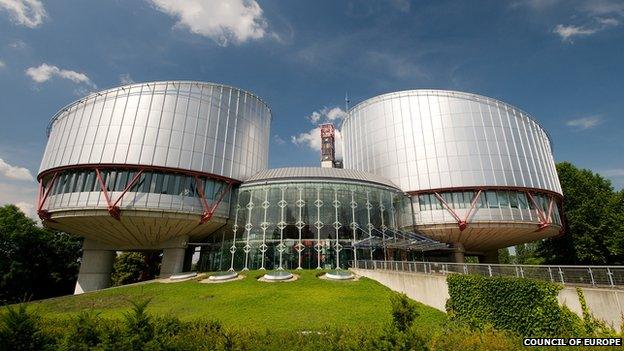
Some Conservatives say the European Court of Human Rights is overreaching itself
The Conservative Party says it will scrap the Human Rights Act and could leave the European Convention on Human Rights in a bid to give Britain the "final say" over domestic cases.
The pledge to create a British Bill of Rights and allow the UK to veto decisions by the European Court of Human Rights in Strasbourg is dependent on the Tories winning a majority at the next election.
It follows a series of disputes between the UK government and the Court.

What is the European Convention on Human Rights?
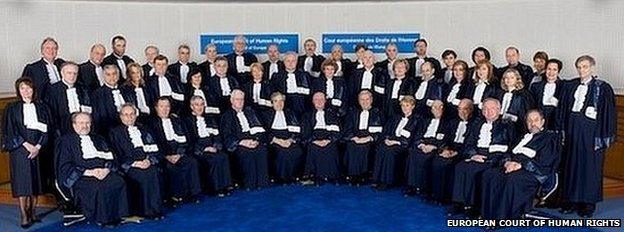
As many as 50,000 cases are lodged with the Court every year
It is an international treaty drafted in 1950, external, setting out a list of civil and political rights including the right to life, prohibition of torture and the freedom of expression.
The Convention is the centrepiece of the 47-member Council of Europe, Europe's main watchdog for human rights and democracy, which was set up in the aftermath of World War II.
The rights are applied by the European Court of Human Rights, based in Strasbourg.
The 1998 Human Rights Act gives effect to the European Convention on Human Rights in UK law, and means individuals can seek a remedy for breach of their Convention rights in domestic courts.
This is all separate from the European Union.

Why does this matter to ordinary citizens?

Ministers say the UK wants to override a minority of judgements
The European Court of Human Rights (ECHR) rules on the grievances of individuals who believe their national courts have failed to deliver justice.
The freedom of individuals to access the court without having to hire expensive lawyers is a core principle.
The court's role is to apply the rights set out in the European Convention on Human Rights and ensure that all 47 nations abide by them. Any one of those states can also bring a case against a fellow Council of Europe state when it believes that state is violating the European Convention.
The court's rulings are legally binding on member nations and the Council of Europe checks to see that national authorities do not simply ignore them.

Why is there disagreement?

Abu Qatada was deported to Jordan in 2013 following a lengthy legal battle
David Cameron has said the ECHR sometimes interferes unnecessarily in cases already dealt with satisfactorily by national courts.
He says some countries such as the UK observe the European Convention's rules much better than others and the ECHR should really focus its efforts on the worst violations of human rights.
Some high-profile cases have set his government at odds with the Strasbourg court.
The court threatened action against the UK for not complying with a 2005 ruling that said prisoners had a right to vote, under the European Convention. The ruling was over the case of a convicted killer, John Hirst.
A majority of MPs at Westminster voted to defy the ECHR on this issue, and the UK remains at odds with Strasbourg over what should happen next.
Then the case of Islamist cleric Abu Qatada made headlines when the ECHR blocked a UK move to deport him to Jordan to face trial. The judges feared that evidence obtained by torture would be used against him in Jordan. He was flown to Jordan in July 2013 and was recently cleared of terror charges.
There have also been disagreements over whether whole-life sentences given to some criminals in the UK are a breach of their human rights.

What are the Conservatives proposing?
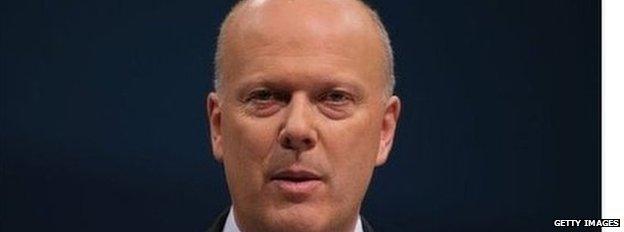
Chris Grayling said the Tories had been considering the move for 10 years
The Conservatives have long proposed scrapping the Human Rights Act and replacing it with a British Bill of Rights but this has been opposed in government by their Liberal Democrat coalition partners.
Under the Conservative plans set out by Justice Secretary Chris Grayling, Strasbourg would not be able to require the UK to change British laws, with its judgements being treated as "advisory" and the UK's Supreme Court being "the ultimate arbiter" on human rights matters.
In their proposals, the Conservatives say they plan to put the wording of the Convention into primary UK legislation, which will be published as a draft Bill by Christmas.
The Bill will "clarify" the rights set out in the Convention, including how they should be applied to people the UK is trying to deport.
Some of the rights will be given a "more precise definition", the Conservative proposals say, suggesting the ECHR has given them an "excessively broad meaning" in its rulings.
The use of human rights law would be limited to the "most serious cases".

What are critics saying?
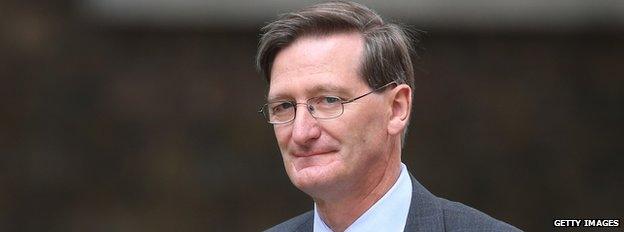
Former Attorney General Dominic Grieve criticised the Conservative proposals
Labour says the Conservatives seem to be proposing to leave the ECHR, which it says would be a "disaster".
The Liberal Democrats have accused the Tories of sacrificing "hard-won" rights for short-term political reasons.
Tory MP and former attorney general Dominic Grieve said the Conservatives' blueprint published on Friday contained "a number of howlers" and "factual inaccuracies" about recent judgements, while former Justice Secretary Ken Clarke said the proposals left him "bewildered".
And The Council of Europe has said it was "inconceivable" that the UK, as a founding member, could leave, and that the proposals were "not consistent" with the European Convention.
- Published3 October 2014
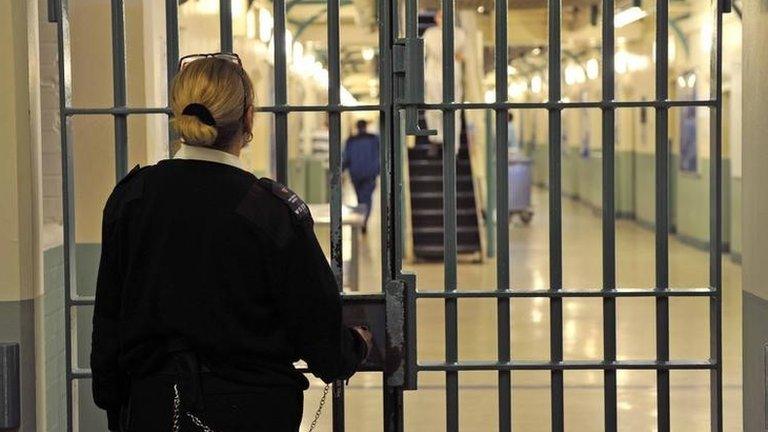
- Published5 February 2015
- Published20 January 2011